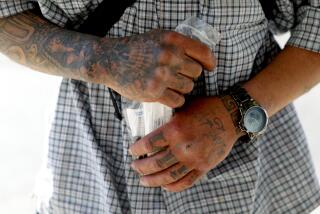Syringes should be sold over the counter
- Share via
For a generally progressive state, California falls surprisingly behind on certain issues. One of these is allowing the purchase of syringes without a prescription. Syringes are already an over-the-counter medical supply in 47 states. It’s long past time for the same to be true in California.
A pilot program signed into law in 2004 by Gov. Arnold Schwarzenegger allowed sales of syringes by pharmacies in counties that elected to join. Los Angeles was one of those. Yes, most of the sales were to addicts, who used the syringes to further their use of illegal drugs. But new syringes help prevent the spread of AIDS and hepatitis C; the rates of those diseases fell in the participating counties, though it’s unclear how much of the change was directly attributable to the sales. Meanwhile, there were no signs that drug abuse worsened in those jurisdictions or that pharmacies became new hangouts for addicts.
Though the pilot program was extended in 2010 for an additional five years, Schwarzenegger was unwilling to sign a sensible bill that would have allowed the sales statewide. Perhaps Gov. Jerry Brown will look more favorably on SB 41, a nearly identical bill that has passed the state Senate and is seen as having a good chance of approval in the Assembly.
Under the bill, written by Sen. Leland Yee (D-San Francisco), it would be up to pharmacies throughout California to decide whether to sell the syringes. Customers would be able to buy as many as 30 at a time. The law would sunset in 2015 unless it is reauthorized after the state Department of Public Health reports on its effects.
The department estimates that the sharing of syringes is the source of 3,000 cases of hepatitis C and 750 cases of HIV each year in California. Access to new syringes also helps prevent the spread of hepatitis B and other blood-borne diseases. It makes economic sense because it prevents diseases that are expensive to treat; customers pay for their own syringes, which cost about a quarter each.
The value of easy access to clean syringes has been known for at least a decade. A 2001 study published by the American Journal of Public Health examined 96 cities, 60 of which did not require a prescription for needles; the rest did. The rates of intravenous drug use in the cities were not significantly different, the researchers found, but the HIV rates in the cities that required prescriptions were twice as high.
The bill deserved to become law last year, and the same is true now. The Assembly should pass and Brown should sign SB 41.
More to Read
A cure for the common opinion
Get thought-provoking perspectives with our weekly newsletter.
You may occasionally receive promotional content from the Los Angeles Times.









